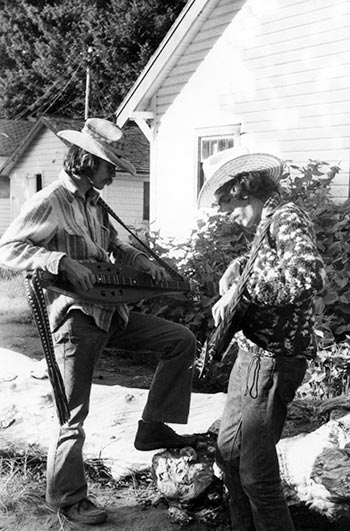Spring of ‘65
Author: American Traditional
Date/Studio: 1978 Kaye-Smith, Seattle, WA
Engineer: Dave Mathew
Producer: Bill Tootell
Original Release: Crossover (KM308)
Current Release: The Complete Recordings (BSR 158)
 I learned this tune from Charlie Berg who learned it from a Holy Modal Rounder record that came out in 1971-- just about the time it was on his radar to teach it to me. For years I thought Peter Stampfel had written it and even gave him the copyright credit for it when we recorded it on the Crossover lp. Internet sure changes a lot of things these days. First among those changes is the ability to do research.
I learned this tune from Charlie Berg who learned it from a Holy Modal Rounder record that came out in 1971-- just about the time it was on his radar to teach it to me. For years I thought Peter Stampfel had written it and even gave him the copyright credit for it when we recorded it on the Crossover lp. Internet sure changes a lot of things these days. First among those changes is the ability to do research.
It turns out Peter and his music partner, Steve Weber, took an American traditional song, changed a few words around and adapted the song for their own use. What they did impart to us via Charlie was the Holy Modal way of doing it. That “ratsy-futsy-scratchy” style is the way Charlie sang everything anyway. I've never tried to sing it sweetly-- seems like that wouldn't be true to the song.
It is worthwhile to hear how J.D. Cornett sings it on Mountain Music of Kentucky which was praised as "one of the greatest records in the entire literature of American folk song" (San Francisco Chronicle 1960). There are also YouTubes of the Holy Modal Rounders doing it out there as well. The Rounders rode the folk music revival of the late 60s while crossing over into the emerging psychedelia sound. In that sense, the way they did it with electric bass and how it builds, Spring of '65 is a “trip song”.
The way Albert and I did it had more of a bluegrass touch. But still, in our pacing we are closer to the Holy Modal Rounder version than we are to J.D. Cornett's. Like the Rounders do in the 2nd half of their version, we take the tune uptempo, following the cadence of the verses. As I write this I have to admit I am listening-- for the first time-- to the Rounder's version. I am quite struck by how similar the pacing, build and vocal styles our versions share. Turns out Charlie was a good conduit.
This is a really good, easy-to-learn song with amazing lyrics that describe a particularly hard time just after the American Civil War. It is a history lesson that speaks to the emotion of the time. Only a song can do justice to those conflicting emotions that are at once both frustrating and yet hopefully resolute. The plow still needed to be turning the ground. But why? In this song one night off for barn-stomping and guilty whisky drinking seems to put it all back into perspective.
Not many American folk tunes are written in a minor. (Notable exceptions are Shady Grove and the Cuckoo.) Albert and I used the d-A-C, Aeolian tuning on our dulcimers to play Spring of '65. That created a heavy drone since only the treble melody strings are ever fretted. These days, rather than retune, I use a bar-E and play the chord changes across all of the strings. It's easier not having to retune on stage but it doesn't have the same feel since the melody is no longer carried by the instrument.
The 70s were the coming of age of the Women's Liberation Movement. When Albert and I recorded the song in 1978 at Kaye-Smith Studios in Seattle, we were not going to sing about “newsy women who gather news about”. We changed that verse to reflect that gossiping was not limited to a single gender.
Many of the traditional English and American folk tunes we had learned, separately and together in our formative years, fell by the wayside for us in the middle 70s. We made a conscious choice to disinclude songs that victimized women-- and there were a lot of them-- with topics like strangling your sweetheart down by the river or cutting of your wife's head because she slept with another. Ick.
There were a slew of other trad tunes we also stopped singing that stereotyped and denigrated women, especially in the category of letting lovers die so one's honor would not be compromised. Ouch. I value folk history as depicted through song but I don't want to entertain my granddaughter with them. We are guilty of revisionism with Spring of '65 but gossiping wasn't the centerpiece of the message.
